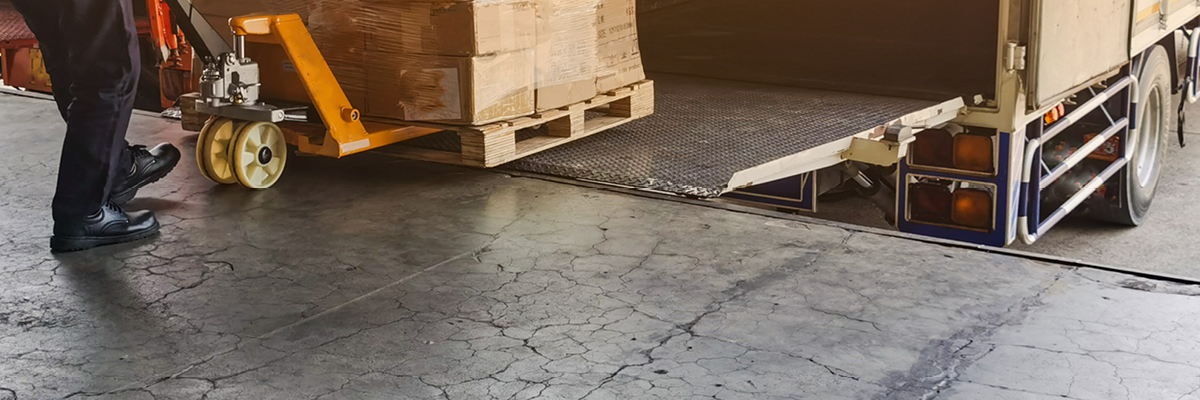How to choose the correct wheels for cracked or chipped floors

Warehouse machines, like forklifts and mobile elevating work platforms, function best when they’re equipped with the best wheels for the situation at hand. On a floor with a rough surface, such as substrate flooring that has been chipped or damaged, it’s especially important to choose strong and reliable wheels to maximise safety.
You’ll find a variety of wheels suitable for damaged substrate floors at TVH. Read on to find out which ones are best for your specific application.
Vulkollan wheels
Vulkollan is a powerful elastomer. Wheels made from this durable material are perfect for heavy-duty work and carrying hefty loads. Vulkollan wheels are non-marking and suitable for long shifts (8+ hours) in a wide range of ambient temperatures. Along with standard Vulkollan wheels, TVH offers several options to suit different conditions:
- Tractothan wheels offer the same impressive properties as Vulkollan wheels, but with even better traction. On top of the excellent grip, Tractothan wheels deliver increased braking efficiency, meaning the machine can be stopped quickly to avoid collisions.
Tractothan wheels are our recommended choice for use on damaged substrate floors in both wet and cold environments. It’s also important to note that they’re not suitable in places where antistatic wheels are required. - High-density Vulkollan wheels are our recommended choice for use in hot and humid environments (> 25 °C). They’re also suitable in the frosty conditions of cold storage (< 0 °C) and provide excellent grip in both oily and wet conditions.
- Vulkollan Quartz wheels are ideal if you’re working on slippery floors as they deliver maximum traction. However, it’s also important to note that they may leave marks on polished concrete.
- Soft Vulkollan wheels significantly reduce noise and vibration and are a great option for cold and/or slippery conditions. However, they’re not suitable for use in hot environments (> 25 °C).
- Vulkollan antistatic wheels are designed to reduce the risk of explosion in hazardous environments. However, they’re not ideal for use on damaged substrate floors. In this case, you’re better off choosing the high-density or quartz Vulkollan wheels.
Polyurethane wheels
At TVH, we offer a few different types of polyurethane wheels. When it comes to working on damaged substrate floors – those with cracked or chipped surfaces – we recommend choosing high-performance polyurethane wheels. These can be used for short or long shifts, and are suitable in both hot and cold temperatures (> 25 °C and < 0 °C). They’re also ideal in humid conditions and on wet or oily surfaces.
For shorter shifts (< 8 hours), soft polyurethane wheels are also a great choice. They’re quiet, non-marking and absorb a good deal of vibration. However, they only offer about 70% of the capacity of standard polyurethane wheels.
Rubber wheels
Rubber wheels are only suitable for shifts that are less than eight hours long. If you need wheels to withstand longer shifts, you’re better off choosing a tougher material like Vulkollan. There are a few different types of rubber wheels that are suitable for cracked or chipped substrate floors in certain circumstances:
- Non-marking rubber wheels are great in situations where hygiene is important, such as in the food industry. They can be used in cold temperatures, humid conditions and on wet surfaces, but they’re not suitable in hot temperatures (> 25 °C) or on oily floors.
- Black rubber wheels are suitable in humid conditions and on wet surfaces, in mild temperatures between 0 and 25 °C. They are quiet and offer a smooth ride, making them ideal for transporting delicate items. However, it’s important to note that black rubber wheels will leave marks on the floor.
- Antistatic rubber wheels are the only suitable option for damaged substrate floors in environments where antistatic wheels are essential.
Nylon wheels
Nylon wheels are not suitable for material handling equipment. However, they’re commonly used on stainless-steel containers and machinery that is predominantly stationary. This is because they’re lightweight and capable of carrying heavy loads. They’re also non-marking and chemical resistant. Nylon wheels are perfect in situations where hygiene is important, such as the food industry. While they’re an option for use on damaged substrate floors in temperatures over 25 °C, nylon wheels offer less grip than other wheels and shouldn’t be considered in cold or humid conditions, or on wet or oily floors.
Steel wheels
Steel wheels are incredibly strong and won’t mark the floor, but they do make a lot of noise. You won’t find them on material handling equipment like forklifts, but they still have their place in the warehouse. They’re mainly installed on waste containers. Steel wheels are suitable for use on cracked or chipped substrate floors when the ambient temperature is above 25 °C, but aren’t recommended for use in cold, humid, oily or wet environments.
To maximise safety and performance, it’s essential to ensure warehouse machines are fitted with the best wheels for the job. By choosing wheels that are optimised for use on damaged substrate floors, you can avoid accidents, breakdowns and downtime. Need more help selecting the best wheels for your situation? Check out our wheel selector to find the best fit.
Discover our wheels catalogue here
Request your customer account to shop parts online
Submit the application form to specify your business needs and request your customer account.
Our sales team will contact you within 3 business days to talk about your business needs and complete registration.
After your account is set up, you will receive a personal login to our online shop. We will guide you in finding parts and placing your first order.
Request your account
Over 75.000 customers trust TVH as their spare parts supplier to ensure their client’s equipment fleet is running smoothly and efficiently. It starts with a customer account.